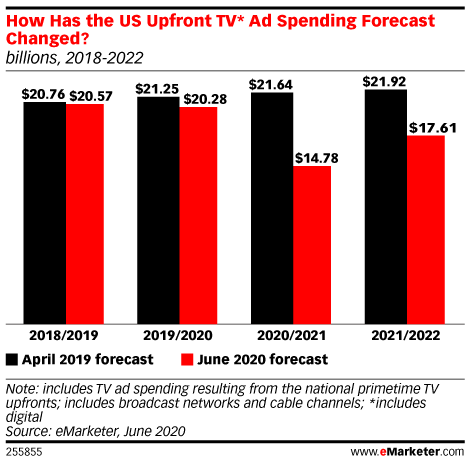The TV upfront events usually dominate the calendars of advertising professionals during the spring months. Naturally, the live presentations, meetings and accompanying social hob-nobbing were abruptly cancelled this year, leaving the industry in a state of uncertainty. This, during a time when media buyers and sellers were already trying to navigate the changing tides of video platforms and viewing habits.
Since then, networks and media companies took their pitches to virtual avenues to engage prospective buyers. However, even figuring out what to present was a tall order, due to the shut-down of TV and film production. Most broadcast pilots were left unfinished, leaving networks with no trailers to tease. Fall lineups were up in the air, not knowing when production will resume. And the partial or complete cancellation of sports seasons left gaping holes in schedules, not to mention the massive loss of ad dollars if there is no Super Bowl. CBS is scheduled to air the event in 2021, if it happens.
With advertisers already pausing, delaying or reducing ad spending, some companies tried to get a creative with their presentations to drum up interest. Disney Advertising Sales used a series of 30-minute roadshow videos to make its pitch to media buyers and clients, featuring the scathing comedic commentary of their old standby, Jimmy Kimmel. ViacomCBS scheduled a series of short “Viacom Upfront @ Home” pitches taking place over the course of two days in May. And perhaps the most untraditional – NBCUniversal aired 30 Rock: A One-Time Special, reuniting the cast for a remotely filmed fictional meeting of the old characters. The hour-long program was designed to promote all things NBC (including their cable networks), with a big emphasis on their new streaming platform, Peacock. Many local NBC affiliates refused to air this special though, claiming the overly promotional nature could drive traditional viewers away.
Still, eMarketer predicts US upfront TV ad spending will drop a substantial 27.1% in the 2020-2021 season to $14.78 billion, a $5.5 billion difference year-on-year. This is a significant change from pre-pandemic estimates, and even from the forecasts in April. We expect to see an approximately $3 billion increase in the 2021-2022 season.

These findings closely coincide with a survey by Advertiser Perceptions that found clients expected to spend 33% less in this year’s upfront, although some of that money might return to the networks in the scatter market.
As with everything else, the industry will need to adapt to work the new landscape. The media companies know they will have to be flexible with advertisers given the state of the economy and as they reconfigure budgets and campaigns. Deadlines will be extended and more leeway will be offered with different types of deals and interactions. ViacomCBS, for instance, also has a new system that they think will make transactions easier on their buyers. Advertisers can get a combination of broadcast, cable and interactive ads in one buy, if that’s how they want to transact. They can also buy a combination of broad reach media based on traditional age/sex demographics, as well as data-targeted audience buys.
It seems that for now, the best thing for both sides is to focus on the short-term. No one knows what the world will be like months down the road. Long-term guarantees will likely be rare this year, and the sellers acknowledge this. Disney Ad Sales president Linda Ferro said, “I’m excited about what the future is going to be, but I’m not closing my eyes to the hard reality of what the impact has been to our clients.”
Media professionals need to adjust their data and operations so they can pivot quickly and capture emerging opportunities. This could also mean radically rethinking timing, such as replacing yearly upfronts with rolling guarantees as production companies get back up to speed, or re-timing upfronts to sync with the rest of the fiscal calendar.
Maybe this pandemic has permanently changed the way upfronts are conducted, but maybe not. I recently read an article written by Fraser Willard, the VP of Mediaocean, and I think he summed it up best, saying “This upfronts season, fast and flexible is the only choice.” It is the only way for everyone to stay afloat.



